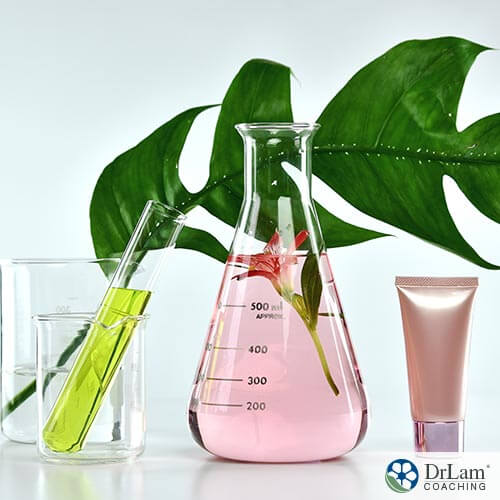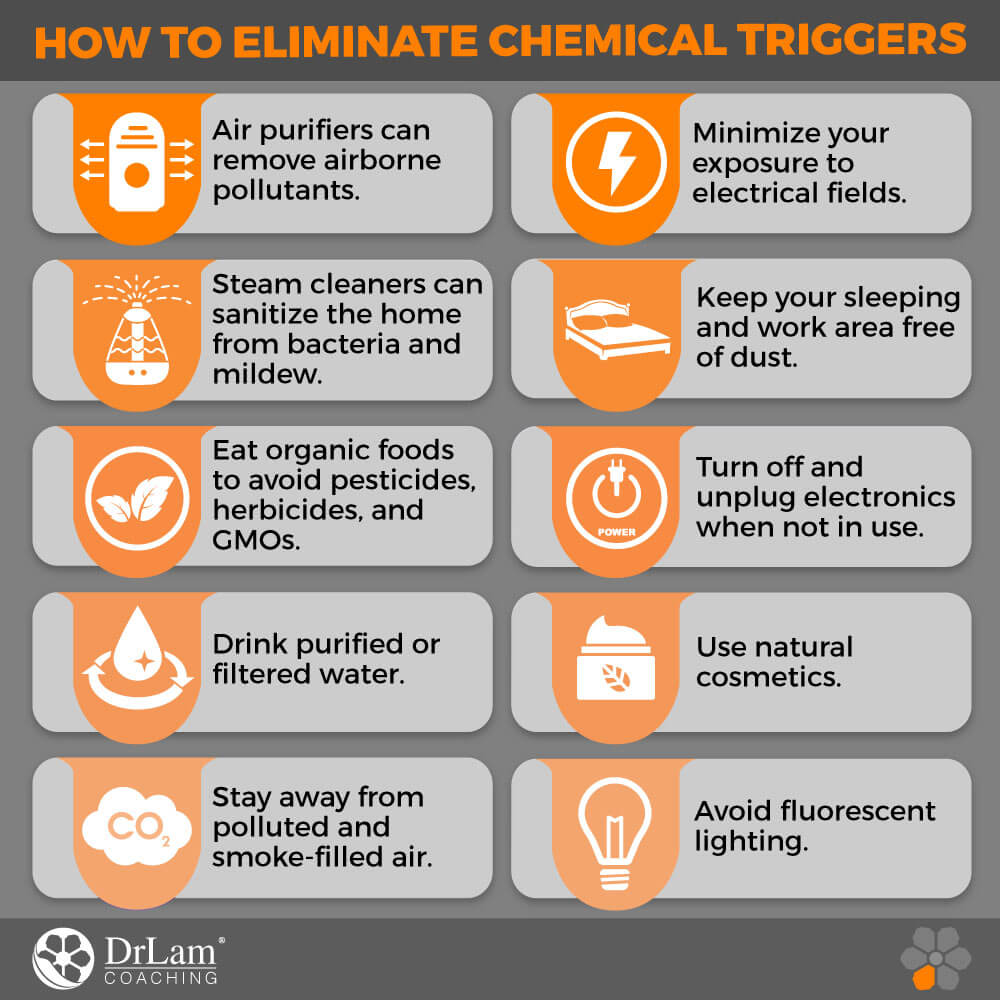 You may have seen ads promoting perfume-free laundry detergent, or natural-based cleaning products. You may even have purchased some soaps or shampoos that are paraben-free. But let’s face it, no matter how hard you try, or how many “safe” products you buy, in today’s world you’re surrounded by harsh, toxic chemicals that are starting to cause major problems. There are a growing number of people who are developing serious intolerances to these substances. In fact, the problem is so severe that a new condition called Multiple Chemical Sensitivity (MCS) has been defined. When you have multiple chemical sensitivities, you may not even notice if you’re young and healthy. But as you get older or have more health conditions, your body can become congested with chemicals and toxins. And over time this can cause serious, ongoing health problems and debilitating symptoms.
You may have seen ads promoting perfume-free laundry detergent, or natural-based cleaning products. You may even have purchased some soaps or shampoos that are paraben-free. But let’s face it, no matter how hard you try, or how many “safe” products you buy, in today’s world you’re surrounded by harsh, toxic chemicals that are starting to cause major problems. There are a growing number of people who are developing serious intolerances to these substances. In fact, the problem is so severe that a new condition called Multiple Chemical Sensitivity (MCS) has been defined. When you have multiple chemical sensitivities, you may not even notice if you’re young and healthy. But as you get older or have more health conditions, your body can become congested with chemicals and toxins. And over time this can cause serious, ongoing health problems and debilitating symptoms.
The symptoms of multiple chemical sensitivity are similar to an allergic response. The symptoms you experience may vary according to each individual, but the most common symptoms of MCS include:
Chemical intolerance symptoms may appear together or alone, and can vary in length from several hours to days.
Chemical sensitivities are often linked to your environment. For this reason, this problem is often referred to as an “environmental illness” or an “idiopathic environmental intolerance”. And chemical sensitivities have become such a big problem for so many people that even the Center for Disease Control and Prevention (CDC) is taking notice. They recently implemented an indoor environmental policy for all its centers prohibiting candles, incense, diffusers, air fresheners, and fragrances of any kind. They claim that the use of products with fragrances may be detrimental to the health of people who suffer from allergies, asthma, headaches, or chemical sensitivities. With the CDC taking such measures, many more places are sure to follow their lead.
Chemical intolerance symptoms will vary from person to person. Some people may react only to certain products, while others become sensitive to most chemicals they are exposed to. The most common triggers of multiple chemical sensitivities include:
If you experience the following, then you may need to seek out help for chemical sensitivities
If you think you have chemical sensitivities, it’s important to keep track of your symptoms and triggers. Unfortunately, at this stage there is no multiple chemical sensitivity cure or even a specific test for diagnosis, so your best chance is to identify the sources of the problem and eliminate them.
The easiest way to track your reactions is to start a journal and record every episode you have in detail. Two weeks to thirty days should give you enough time to go through monthly cycles of cleaning the house, washing laundry, bathing, and cooking to see exactly what products are causing problems. If you have MCS, you will begin to see patterns to how your body is reacting.
You can then begin to find solutions by avoiding triggers. This will help to keep your chemical intolerance symptoms under control and manageable.

It is virtually impossible in today’s day and age to eliminate all the triggers that may be setting off your chemical sensitivities unless you’re willing to live in a bubble. However, there are things you can do to make your home and environment as MCS friendly as possible including:
You also have to remove the chemicals that have already made their way into your body. A good way to do that is by conducting an organ detox. Cleaning the liver, colon, and other organs will allow the body to function more efficiently and process future chemicals more effectively. When your system gets overloaded and congested, it can’t eliminate these foreign particles that have entered the body. That’s why an initial detox is vital for recovery.
The key to doing this safely is to understand the body and design a recovery program that doesn’t add additional stress to the body. Sometimes detoxification is done too quickly, which can result in the release of massive amounts of toxins from the cells into the body. This can lead to crashes in those with adrenal fatigue.
 While in the advanced stages of adrenal fatigue syndrome (AFS), many people suffer with multiple chemical sensitivities. If this occurs to you, you may suddenly find yourself affected by things you never had problems with before. You may develop food intolerances and react to soy, wheat, corn, and dairy. It’s also fairly common for sufferers to develop chemical sensitivities to nail polish, bathroom cleaners, or laundry detergents.
While in the advanced stages of adrenal fatigue syndrome (AFS), many people suffer with multiple chemical sensitivities. If this occurs to you, you may suddenly find yourself affected by things you never had problems with before. You may develop food intolerances and react to soy, wheat, corn, and dairy. It’s also fairly common for sufferers to develop chemical sensitivities to nail polish, bathroom cleaners, or laundry detergents.
In the advanced stages of adrenal fatigue, the body can no longer filter and eliminate the toxins as it once did, and it becomes a highly congested battlefield. It calls for help from all the organ-systems, or what is known as the NeuroEndoMetabolic (NEM) Stress Response System. The adrenals cry for help, the NEM system kicks in, and all the organs go into overdrive. However, if the problem isn’t alleviated and chemical intolerance symptoms don’t abate, the liver can become exhausted from producing, secreting, and regulating the additional stress related compounds. Different circuits in the body can start to break down and chemical sensitivity syndrome kicks in.
As horrible as it may seem, all hope is not lost. There are steps you can take to reverse the congestion and recover from AFS and from chemical sensitivities. To do this, you must be attentive to your body. Identify and eliminate triggers of chemical sensitivities where possible and make lifestyle changes to support your health. This will aid your body in resisting the damage that chemical sensitivities their symptoms can do.
 If all of this sounds and feels too familiar, then you may be suffering from multiple chemical sensitivities and/or adrenal fatigue syndrome, as these two ailments are on the rise in our world today. This is because of the high level of chronic stress that most people experience each and every day, so much so that stress has become the norm. If you believe that you suffer from this issue, here’s what to do to bring your health back to optimal levels and regain control of your life: :
If all of this sounds and feels too familiar, then you may be suffering from multiple chemical sensitivities and/or adrenal fatigue syndrome, as these two ailments are on the rise in our world today. This is because of the high level of chronic stress that most people experience each and every day, so much so that stress has become the norm. If you believe that you suffer from this issue, here’s what to do to bring your health back to optimal levels and regain control of your life: :
If you want to know more about chemical sensitivities, contact our team on +1-626-571-1234. You can also use the Ask The Doctor system to ask a question by clicking here.
Yes, people with Adrenal Fatigue Syndrome are very prone to having Multiple Chemical Sensitivity as their bodies have already reached overloads from high stress and inadequate hormone levels. Leaving their organs, hormones and entire body systems extremely sensitive to environmental toxins and allergens.
